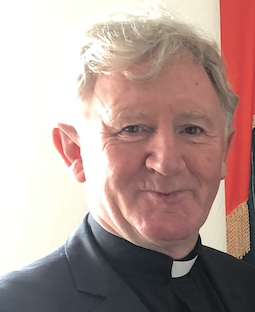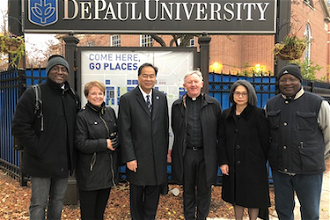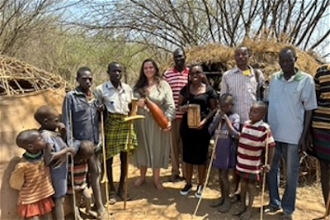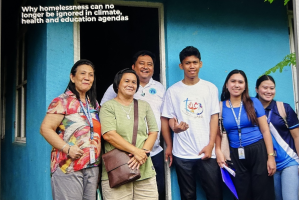The Dynamics of Conflict and Religion in Eastern Africa

Fr Patrick Devine
The Tangaza Journal of Theology & Mission, published by Tangaza University College in Nairobi, carries a lengthy paper by Irish missionary priest, Fr Patrick Devine PhD, on the subject of "Conflict and Religion in Eastern Africa: A Conceptual Consideration of Radicalisation, Fundamentalism, Extremism, Terrorism, Tolerance, and their Interaction Dynamics".
The purpose of the paper is to seek to understand the reasons for radicalisation and extremism in Eastern Africa and the ideological dynamics that underpin and structure the way in which they are manifest in the region. It includes the explanation of the key terms used, elucidation of their conceptual nuances, and inter-connectedness, followed by an introduction to the underlying causes of radicalism and extremism in eastern Africa and finally, proposals to address and counter these challenges. In this article, I review these complex issues for the benefit of a wider audience.
Eastern Africa faces a complex interplay of fragile institutions, poverty amid abundance, and regular violent conflict. As globalisation heightens the interconnectivity of security, the region's instability is a concern for international actors. A nuanced exploration reveals the dual role of religion - both as a driver of radicalisation and as a force for peace-building and tolerance.
To transform the relationship between religion and conflict, a multi-disciplinary approach is essential. It requires collaboration across society - civil, academic, religious, and governmental - and demands both theoretical understanding and technical skills. Fr. Devine's paper offers valuable insights into the ideological frameworks behind extremism and practical proposals to address them.
Conceptual Challenges
Fr Devine emphasizes the importance of understanding "essentially contested concepts" ideas like radicalisation, fundamentalism, extremism, terrorism, and tolerance. These are inherently debatable, shaped by context and ideology, and must be interpreted through a cultural lens. This conceptual clarity is vital in assessing their dynamics in Eastern Africa.
Radicalisation and Extremism
Radicalisation is a progressive process whereby individuals adopt extreme ideals that often culminate in violence. It may begin non-violently, driven by personal significance, ideological expression, or social grievances. Non-violent extremism can act as a gateway to terrorism when societal tolerance collapses.
Fundamentalism, though rooted in religious claims to absolute truth, can also reflect secular ideologies. It challenges prevailing norms, sometimes militantly, and can morph into extremism. Tolerance - defined and enforced by the state - becomes fragile when threatened by such militancy. Balancing tolerance with security is key to maintaining social cohesion.
Terrorism, often described as politically or religiously motivated violence, is another contested concept. Its definition varies by context, sometimes viewed as resistance, other times as a threat to public order. Its tactics - bombings, kidnappings, and attacks - instil fear and force political change. Understanding its psychological and symbolic nature is vital for counter-strategies.
Causes of Radicalisation
Radicalisation in Eastern Africa is deeply rooted in socio-economic and psychological realities. Poverty, unemployment, and disenfranchisement - particularly among urban youth - create vulnerability. The COVID-19 pandemic intensified these conditions, exacerbating marginalisation. Weak governance and exclusionary law enforcement further alienate communities.
Psychologically, individuals seek significance and belonging, especially in environments lacking national identity. Historical ethnic conflicts and competition for resources add fuel to radical ideologies. Extremist groups exploit these vulnerabilities, facilitated by access to weapons and funding.
Macro policy decisions - particularly those from institutions like the IMF and World Bank - have worsened the situation. Structural Adjustment Programs and neo-liberal models have diminished state sovereignty, deepened poverty, and failed to incorporate indigenous cultural values. The legacy of imperialism and neo-colonialism continues to shape resistance and conflict.
Religion: Source of Conflict or Peace?
Religion plays a dual role in Eastern Africa. It can inspire violence when politicised or mis-interpreted, as seen in attacks in Kenya and Tanzania. When religious institutions prioritise control over transformation, they may foster extremism.
Yet, religion also offers paths to peace. Interfaith dialogue and emphasis on universal values like compassion, dignity, and justice can counter radical ideologies. Promoting tolerance through spiritual teachings is a powerful tool for reconciliation.
Strategies for Change
Effective counter-extremism demands a multi-faceted strategy. Empowering communities with conflict resolution skills is foundational. Reforms in law enforcement, inclusive policy-making, and strategic communication can build resilience.
Youth engagement through education and vocational training provides alternatives to radicalisation. Advocacy campaigns must promote narratives of tolerance and co-existence, while structural reforms address grievances and systemic injustice.
Central to these efforts is the recognition of human dignity. A rights-based approach fosters inclusive societies and nurtures positive peace. Development projects that enhance livelihoods can diminish the appeal of extremist groups.
The Role of the Shalom Centre
Dr Devine is well placed to write this seminal paper. After years of missionary work in Eastern Africa he saw the need for a more strategic approach to conflict resolution and peace-building. So, in 2009, he set up the Shalom Centre for Conflict Resolution and Reconciliation which has become recognised internationally, including by the UN and academic institutions.
Shalom sets out to tackle the root causes, as distinct from just dealing with the symptoms, of conflict by having a qualified international team of peace practitioners, from within and outside Africa, who have a vocational commitment to conflict transformation. In 2017, their peace-building work which had been witnessed on the ground by an Irish Government Minister, Joe McHugh, was lauded by him in the EU Development Council as an approach that should be supported and promoted.
The Devine paper can be accessed at: https://shalomconflictcenter.org/wp-content/uploads/2025/07/Patrick-Devine-Tangaza-Journal-Conflict-and-Religion-in-Eastern-Africa-Jun-2025.pdf
Beyond his academic pursuits, Dr Devine is an influential voice in global peace-building circles. He recently published a book - "Persistent Conflict Between the Pokot and Turkana: Causes and Policy Implications" - which can be purchased on Amazon, Barnes & Noble, Notion Press, and Discover Books.
(Matt Moran is a writer and author living in Ireland. His writing focuses on missionary development, peace-building, and social and religious issues. His latest book is the "Theology of Integral Human Development: the role of faith in international development and public affairs" available from mattmoran2021@gmail.com).


















